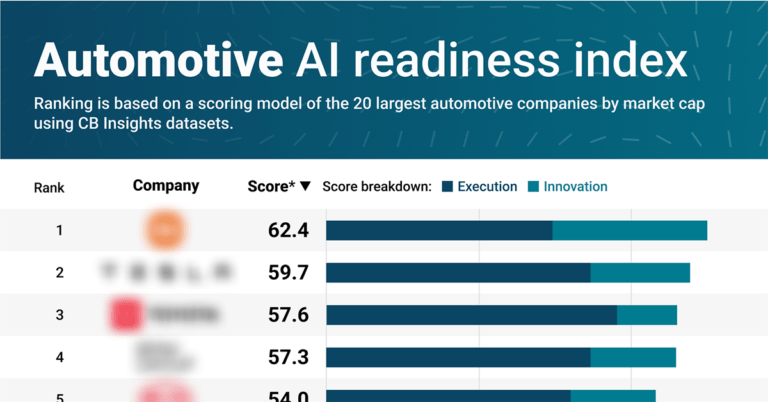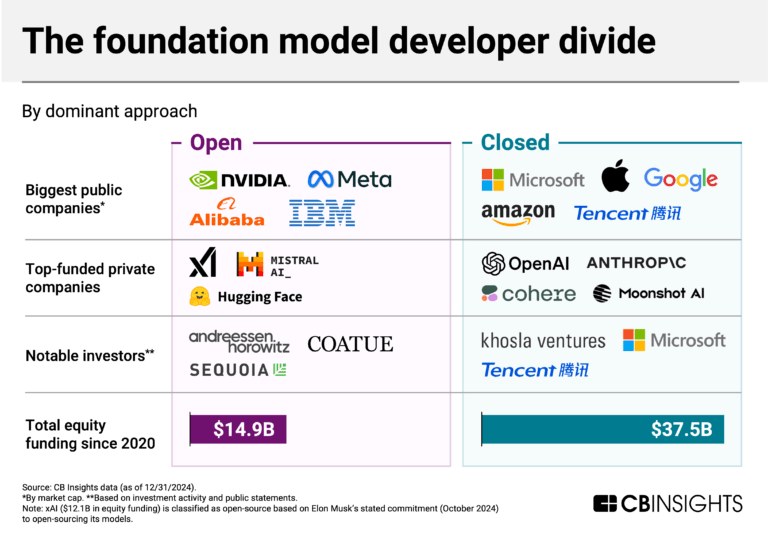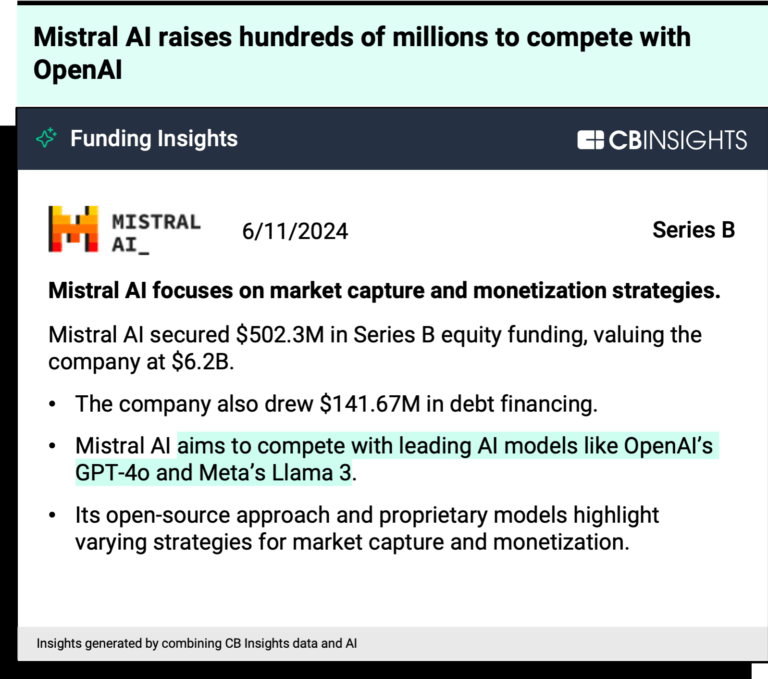
Mistral AI
Founded Year
2023Stage
Series C | AliveTotal Raised
$2.711BValuation
$0000Last Raised
$1.523B | 10 days agoRevenue
$0000Mosaic Score The Mosaic Score is an algorithm that measures the overall financial health and market potential of private companies.
+32 points in the past 30 days
About Mistral AI
Mistral AI focuses on the development of open-source artificial intelligence models in the technology sector. Its main offerings include efficient, adaptable artificial intelligence (AI) models that allow for full customization by users without requiring their data. Its models are primarily used in the technology industry. It was founded in 2023 and is based in Paris, France.
Loading...
ESPs containing Mistral AI
The ESP matrix leverages data and analyst insight to identify and rank leading companies in a given technology landscape.
The Large language model (LLM) developers market offers foundation models and APIs that enable enterprises to build natural language processing applications for multiple functions. These include content creation, summarization, classification, chat, and sentiment analysis. Companies in this market develop and train their own large-scale language models — which are pre-trained on vast amounts of te…
Mistral AI named as Outperformer among 15 other companies, including Google, IBM, and Meta.
Loading...
Research containing Mistral AI
Get data-driven expert analysis from the CB Insights Intelligence Unit.
CB Insights Intelligence Analysts have mentioned Mistral AI in 21 CB Insights research briefs, most recently on Sep 5, 2025.
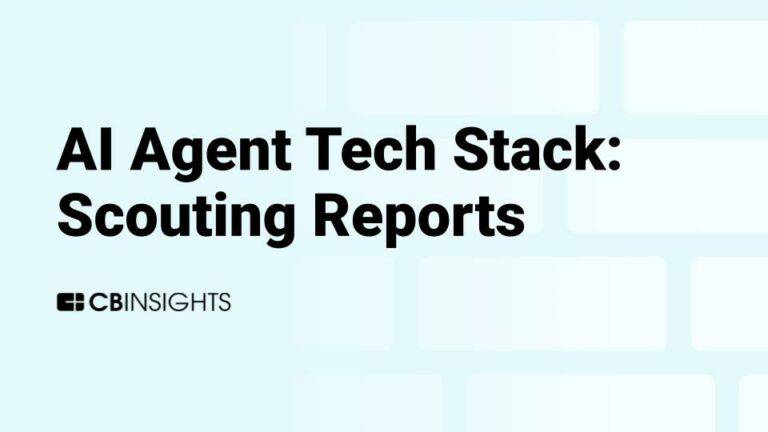
Sep 5, 2025 report
Book of Scouting Reports: The AI Agent Tech Stack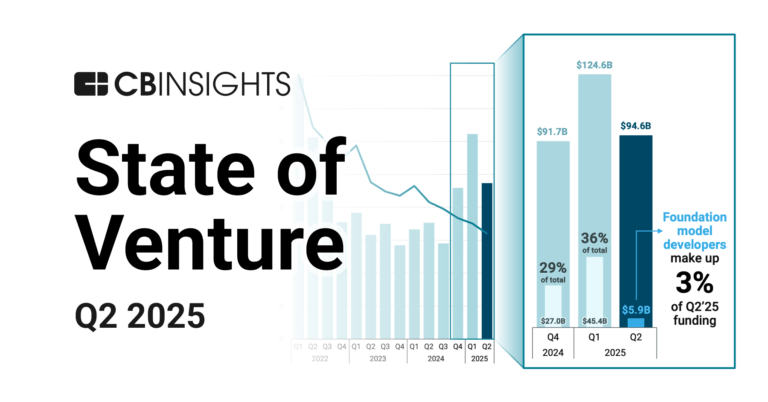
Jul 10, 2025 report
State of Venture Q2’25 Report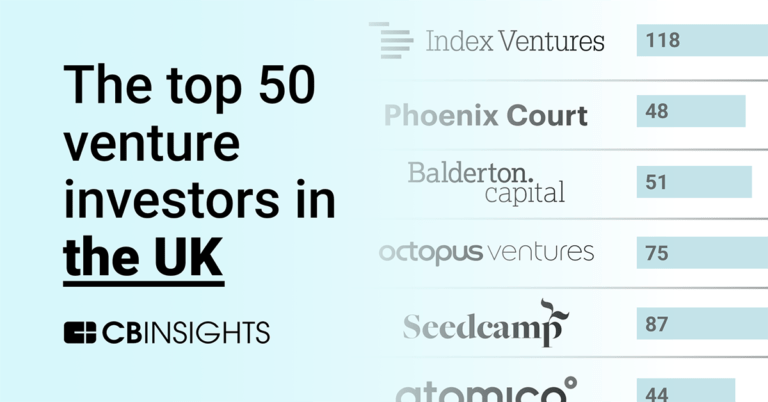
May 6, 2025
The top 50 venture investors in the UK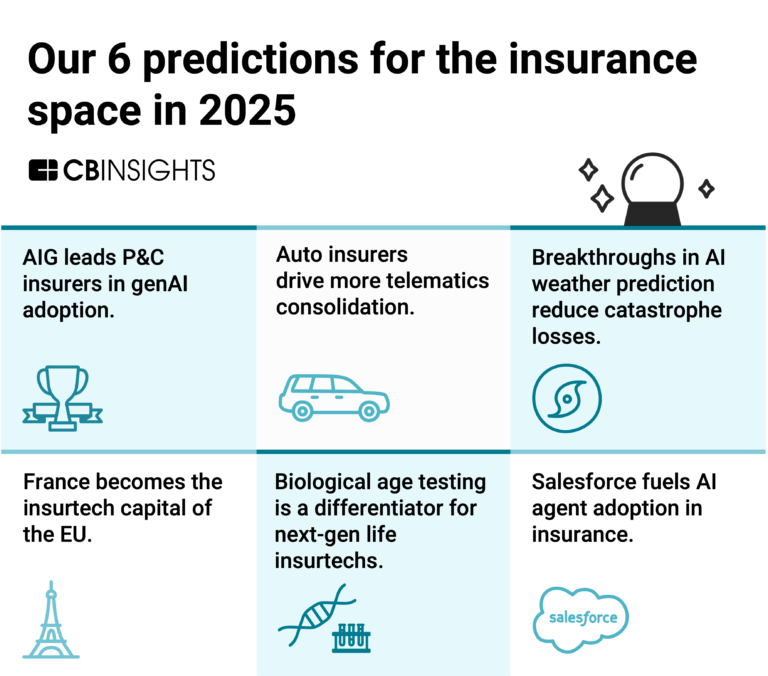
Mar 12, 2025
Our 6 predictions for the insurance space in 2025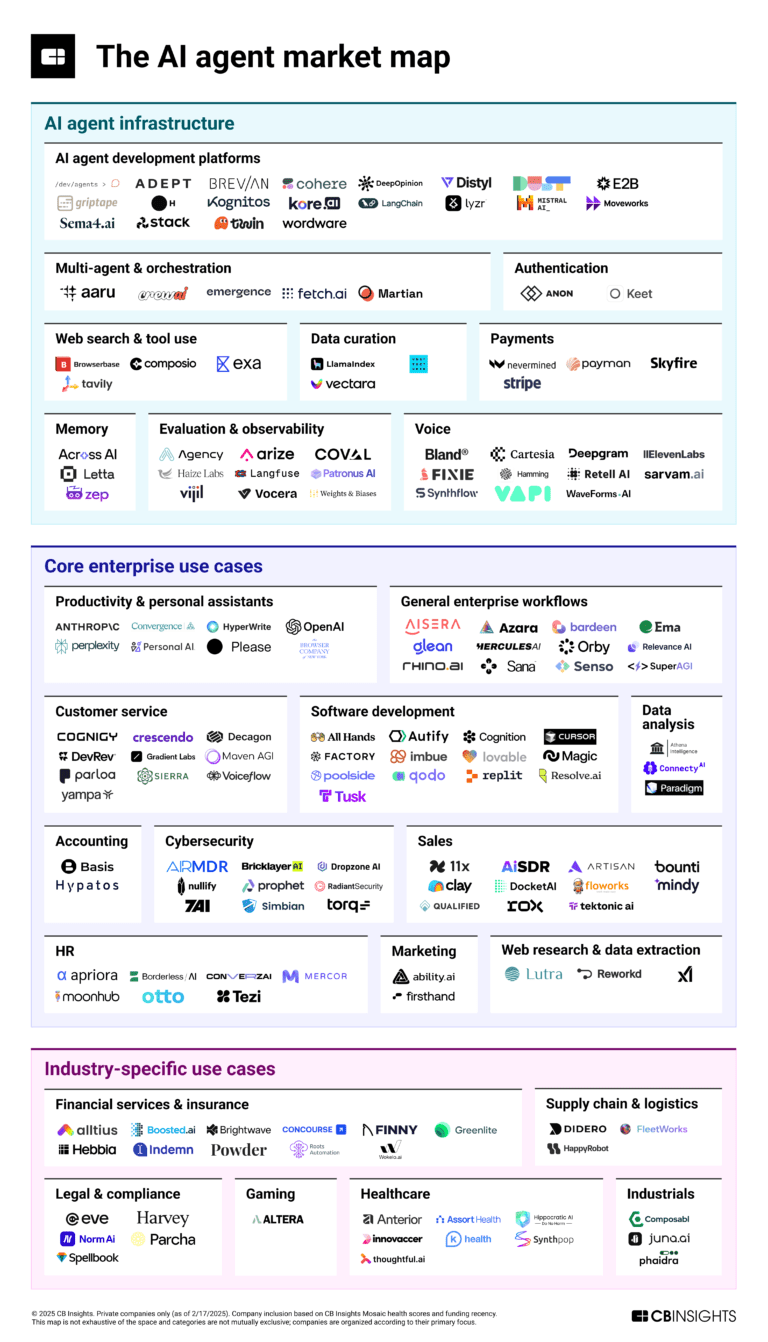
Mar 6, 2025
The AI agent market mapExpert Collections containing Mistral AI
Expert Collections are analyst-curated lists that highlight the companies you need to know in the most important technology spaces.
Mistral AI is included in 6 Expert Collections, including Unicorns- Billion Dollar Startups.
Unicorns- Billion Dollar Startups
1,287 items
Artificial Intelligence
13,028 items
Companies developing artificial intelligence solutions, including cross-industry applications, industry-specific products, and AI infrastructure solutions.
Generative AI
2,841 items
Companies working on generative AI applications and infrastructure.
AI 100 (2024)
100 items
AI agents
376 items
Companies developing AI agent applications and agent-specific infrastructure. Includes pure-play emerging agent startups as well as companies building agent offerings with varying levels of autonomy. Not exhaustive.
AI 100 (All Winners 2018-2025)
100 items
Latest Mistral AI News
Sep 16, 2025
Venta AI founder Lucas Spreiter warns Europe risks falling behind in the next wave of labour automation September 15, 2025 - 6:30 am Founders’ takes is a new series featuring expert insights from tech leaders transforming industries with artificial intelligence. In this edition, Lucas Spreiter, founder of German startup Venta AI , shares his vision of AI employees. Artificial intelligence is about to enable the most dramatic shift of the century: the transition from human labour to AI labour. In the coming years, businesses won’t just use AI as a tool — they’ll employ AI as real colleagues, handling critical workflows end-to-end. That shift is inevitable. The real question is: whose employees will we be hiring? If Europe doesn’t catch up with the US and China and build its own AI employees, we could end up outsourcing a major chunk of our economic value creation — or as we Germans call it. Wertschöpfung: the very core of how we produce wealth. State of AI The breakthrough came with OpenAI’s ChatGPT in 2022. It proved that knowledge work could be automated at scale: research, writing, coding, analysis — all suddenly possible by software instead of people. The emergence of AI agents takes these capabilities even further. With agents, AI models can not only respond to textual input, but also take over entire tasks. AI today is able to plan, reason, and execute workflows across multiple tools and channels. The 💜 of EU tech The latest rumblings from the EU tech scene, a story from our wise ol' founder Boris, and some questionable AI art. It's free, every week, in your inbox. Sign up now! OpenAI still dominates this field, tightly integrated with Microsoft — but the competition has become fierce. Google has caught up with its Gemini models, Meta with LLaMA and Anthropic with Claude. Still, there is a pattern: the leaders of today’s AI revolution are almost exclusively American tech giants, who not only develop and control the models, but also the infrastructure and workflows that power businesses worldwide. Their biggest challenger comes from the East. China has shown with DeepSeek that it’s possible to catch up — and fast. The system outperformed many Western models on benchmarks while running with radically lower computing costs. Beijing’s heavy state backing ensures that China won’t stay a follower for long. State of Europe Long before ChatGPT became a household name, European researchers laid the groundwork for modern AI. In the late 1980s, Yann LeCun (Université Pierre-et-Marie-Curie, Paris) pioneered Convolutional Neural Networks (CNNs), forming the basis of computer vision and multimodal AI. In 1997, Sepp Hochreiter and Jürgen Schmidhuber (TU Munich) invented Long Short-Term Memory (LSTM) networks, crucial for speech recognition, translation, and NLP. In 2016, London-based DeepMind stunned the world when AlphaGo defeated world champion Lee Sedol, while LMU Munich’s CompVis group, led by Professor Björn Ommer, advanced generative AI, culminating in Stable Diffusion. The paradox is clear: Europe invents, others commercialise. LeCun moved to Meta , DeepMind was acquired by Google, and Stable Diffusion was monetised via Stability AI in London and the US. A new generation of European AI companies is trying to change that. France’s Mistral is staking Europe’s claim to sovereign AI, building open-source LLMs and enterprise tools like Le Chat that have attracted customers such as AXA and BNP Paribas. Black Forest Labs, spun out of the same LMU team behind Stable Diffusion, builds one of the most powerful image generators — and aims to keep cutting-edge research and commercialisation in Europe. Other startups, like Germany’s Langdock, have taken a different path. Instead of building foundation models themselves, they enable companies to use existing LLMs while keeping the data and workflows in-house. The upcoming rise of AI employees We are only scratching the surface of what AI can do. Today’s models — powerful as they may be — are still early-stage. The real value won’t come from the models themselves, but from how we apply them: automating workflows, streamlining operations, and effectively creating AI employees that can handle complex tasks across businesses. For Europe, this is a golden opportunity. Our industries are highly efficient, with clearly defined, rule-based workflows — exactly the kind of environment where AI thrives. Manufacturing, logistics, finance, insurance, and even customer support have massive potential to be augmented or replaced by AI systems that can follow documented procedures, make decisions, and execute entire processes autonomously. The monetisation upside is enormous. Every workflow that can be automated is a chance to reduce costs, improve speed, and scale operations. And unlike consumer-facing AI hype, this value is tangible: it sits directly in enterprise productivity and efficiency. But the clock is ticking. If Europe doesn’t act now to train, deploy, and integrate AI employees locally, we risk becoming passive consumers. AI labour will be imported from the US, along with the associated value creation. Instead of leading the next industrial revolution, we’ll be paying foreign providers to run our businesses. Europe’s challenge — and its opportunity — is clear: turn its existing industrial advantage into a homegrown AI workforce. The companies that succeed in creating, training, and scaling AI employees here will define the next wave of economic leadership. A first battlefield for AI employees: Sales automation If there’s one field where AI employees are already proving their worth, it’s sales automation. Sales workflows are often highly manual, repetitive, and rule-based — from building lead lists and monitoring markets to drafting outreach emails and even making cold calls. This makes them a natural playground for AI that can follow clear processes and execute tasks at scale. The startup 11x.ai demonstrated the potential — and the risks. Originally from the UK, the team relocated to the US after a $50mn financing round and claimed to have created “digital workers” with “human results” that can automate sales workflows from prospecting to closing deals. They grew rapidly, but their claims drew scrutiny: a TechCrunch investigation highlighted that they struggled with customer retention, leading to the CEO stepping down. Still, their rise illustrates the massive value and speed at which AI can transform sales. But a system like 11x.ai would have a hard time in Europe. Sales here emphasise quality over quantity, strict compliance rules restrict unsolicited email outreach, and GDPR governs every touchpoint of data handling. A US-centric AI employee simply cannot be dropped into European workflows. That’s why my startup, Venta AI , takes a localised approach. Instead of chasing a global market, our team in Germany is designing AI sales employees tailored to European specifics, respecting cultural norms, legal boundaries, and data protection standards. As our founder, Lucas Spreiter, told Handelsblatt : “You wouldn’t hire an American for a German sales role — and the same applies to AI.” Europe’s choice Europe has the talent, research, and industrial efficiency to lead the next wave of AI labour — but only if it acts now. The rise of AI employees is inevitable, and the real value lies in how these models are applied, not just their raw capabilities. By building AI systems that respect European workflows, culture, and compliance, startups like Mistral, Black Forest Labs, Langdock, and Venta AI are turning potential vulnerability into opportunity. The message is clear: Europe can either import AI labour from the US and fall behind, or create its own AI employees and capture the economic and strategic value of this transformation. The choice will define the continent’s role in the AI-powered economy of tomorrow.
Mistral AI Frequently Asked Questions (FAQ)
When was Mistral AI founded?
Mistral AI was founded in 2023.
Where is Mistral AI's headquarters?
Mistral AI's headquarters is located at 15 rue des Halles, Paris.
What is Mistral AI's latest funding round?
Mistral AI's latest funding round is Series C.
How much did Mistral AI raise?
Mistral AI raised a total of $2.711B.
Who are the investors of Mistral AI?
Investors of Mistral AI include ASML, Lightspeed Venture Partners, Cisco Investments, Bpifrance, Headline and 44 more.
Who are Mistral AI's competitors?
Competitors of Mistral AI include Decart, OpenAI, xAI, Multiverse Computing, AI21 Labs and 7 more.
Loading...
Compare Mistral AI to Competitors

Anthropic focuses on artificial intelligence (AI) safety and research within the artificial intelligence sector. It offers AI models, including Claude Opus 4, Claude Sonnet 4, and Claude Haiku 3.5, for various applications such as coding, customer support, and education. The company primarily serves sectors that require AI solutions, including technology, education, and customer service industries. It was founded in 2021 and is based in San Francisco, California.

OpenAI offers artificial intelligence (AI) research and deployment focused on ensuring that AI benefits all of humanity. Its main offerings include developing AI technologies with a commitment to safety, alignment with human values, and broad societal benefits. Its products and services are designed to address global challenges and promote the equitable distribution of AI advantages. It was founded in 2015 and is based in San Francisco, California.

Fireworks AI specializes in generative artificial intelligence platform services, focusing on inference and model fine-tuning within the artificial intelligence sector. The company offers an inference engine for building production-ready AI systems and provides a serverless deployment model for generative AI applications. It serves AI startups, digital-native companies, and Fortune 500 enterprises with its AI services. It was founded in 2022 and is based in Redwood City, California.

AdGen AI is a company that provides AI-driven advertising solutions within the digital marketing sector. The company has a platform that generates, tests, and publishes ads across various channels, using AI to create ad variations and optimize them for performance. AdGen AI serves marketing agencies, small businesses, startups, eCommerce brands, and enterprises aiming to improve their ad creation and publishing processes. It is based in Austin, Texas.

Cohere operates as an enterprise artificial intelligence (AI) company building foundation models and AI products across various sectors. The company offers a platform that provides multilingual models, retrieval systems, and agents to address business problems while ensuring data security and privacy. Cohere serves financial services, healthcare, manufacturing, energy, and the public sector. It was founded in 2019 and is based in Toronto, Canada.

MI2.ai focuses on machine learning predictive models in the data science and artificial intelligence sectors. The company provides services related to responsible machine learning practices, including research and consulting. It serves the academic community and businesses interested in implementing AI practices. The company was founded in 2016 and is based in Warszawa, Poland.
Loading...

